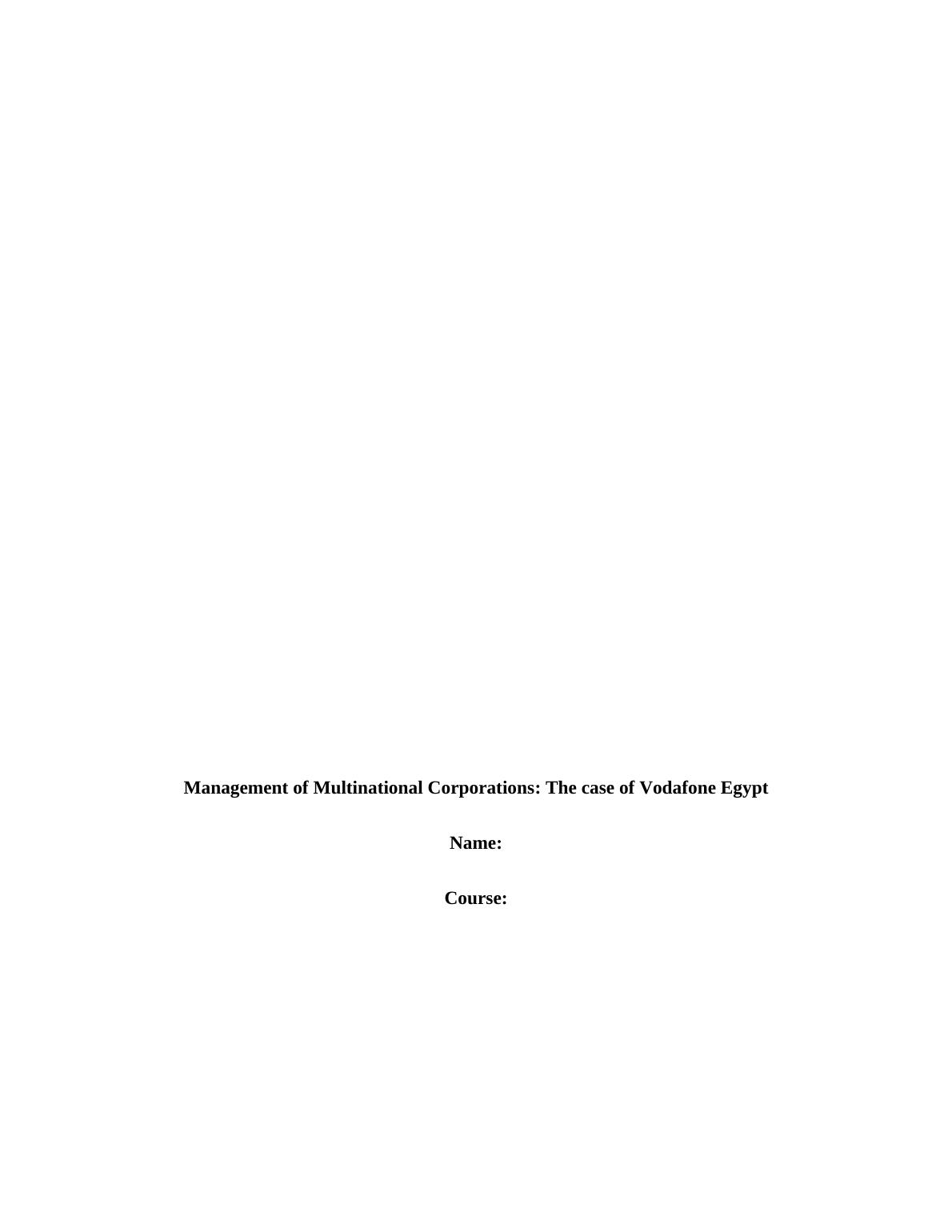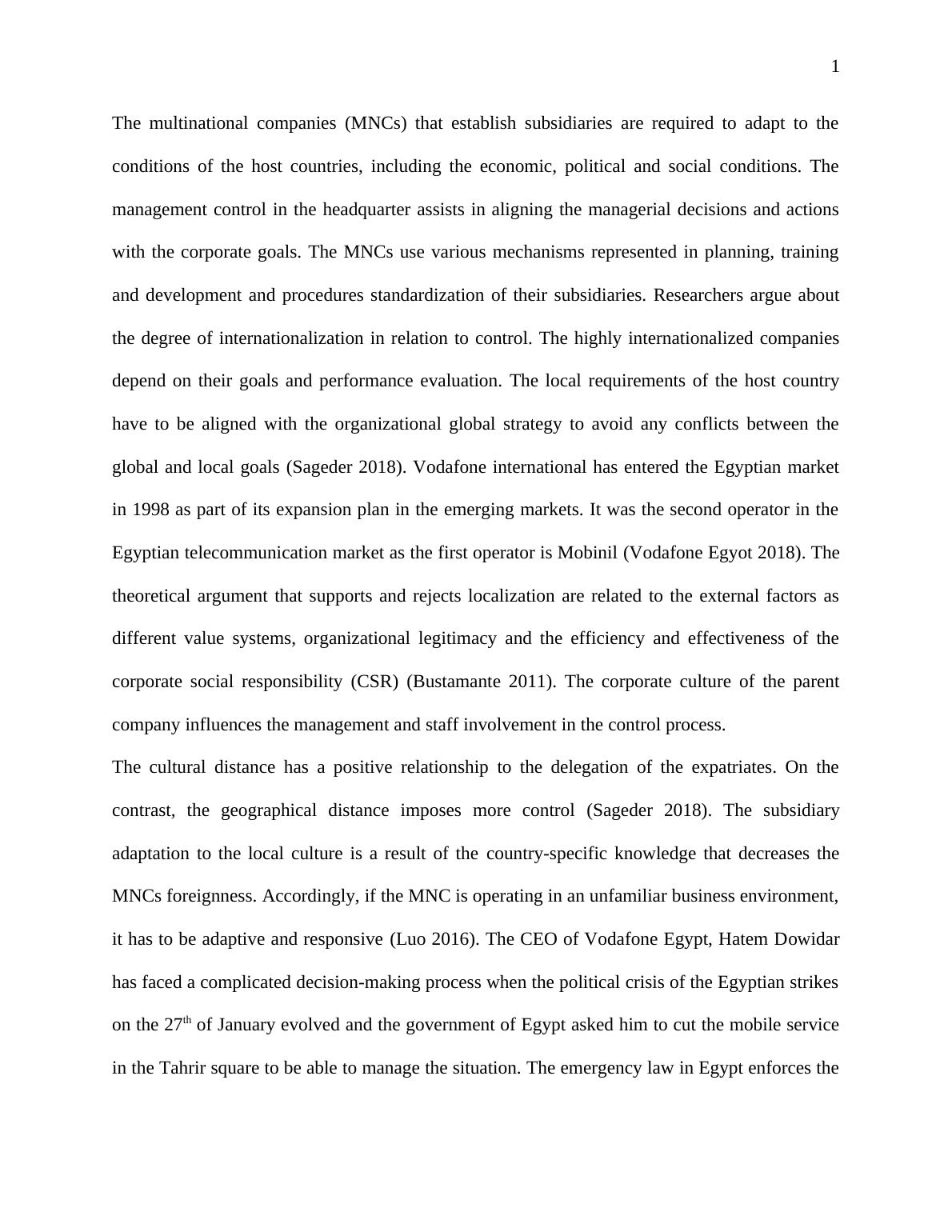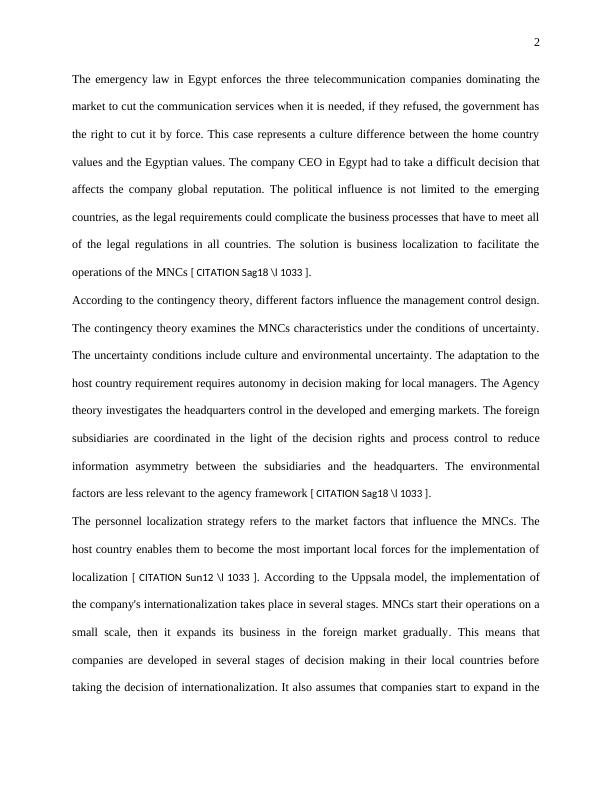Management of Multinational Corporations: The case of Vodafone Egypt
Added on 2021-06-17
9 Pages2108 Words61 Views
Management of Multinational Corporations: The case of Vodafone EgyptName:Course:

1The multinational companies (MNCs) that establish subsidiaries are required to adapt to theconditions of the host countries, including the economic, political and social conditions. Themanagement control in the headquarter assists in aligning the managerial decisions and actionswith the corporate goals. The MNCs use various mechanisms represented in planning, trainingand development and procedures standardization of their subsidiaries. Researchers argue aboutthe degree of internationalization in relation to control. The highly internationalized companiesdepend on their goals and performance evaluation. The local requirements of the host countryhave to be aligned with the organizational global strategy to avoid any conflicts between theglobal and local goals [ CITATION Sag18 \l 1033 ]. Vodafone international has entered the Egyptianmarket in 1998 as part of its expansion plan in the emerging markets. It was the second operatorin the Egyptian telecommunication market as the first operator is Mobinil [ CITATION Vod18 \l1033 ]. The theoretical argument that supports and rejects localization are related to the externalfactors as different value systems, organizational legitimacy and the efficiency and effectivenessof the corporate social responsibility (CSR) [ CITATION Bus11 \l 1033 ]. The corporate culture ofthe parent company influences the management and staff involvement in the control process. The cultural distance has a positive relationship to the delegation of the expatriates. On thecontrast, the geographical distance imposes more control [ CITATION Sag18 \l 1033 ]. Thesubsidiary adaptation to the local culture is a result of the country-specific knowledge thatdecreases the MNCs foreignness. Accordingly, if the MNC is operating in an unfamiliar businessenvironment, it has to be adaptive and responsive [ CITATION Luo16 \l 1033 ]. The CEO ofVodafone Egypt, Hatem Dowidar has faced a complicated decision-making process when thepolitical crisis of the Egyptian strikes on the 27th of January evolved and the government ofEgypt asked him to cut the mobile service in the Tahrir square to be able to manage the situation.

2The emergency law in Egypt enforces the three telecommunication companies dominating themarket to cut the communication services when it is needed, if they refused, the government hasthe right to cut it by force. This case represents a culture difference between the home countryvalues and the Egyptian values. The company CEO in Egypt had to take a difficult decision thataffects the company global reputation. The political influence is not limited to the emergingcountries, as the legal requirements could complicate the business processes that have to meet allof the legal regulations in all countries. The solution is business localization to facilitate theoperations of the MNCs [ CITATION Sag18 \l 1033 ].According to the contingency theory, different factors influence the management control design.The contingency theory examines the MNCs characteristics under the conditions of uncertainty.The uncertainty conditions include culture and environmental uncertainty. The adaptation to thehost country requirement requires autonomy in decision making for local managers. The Agencytheory investigates the headquarters control in the developed and emerging markets. The foreignsubsidiaries are coordinated in the light of the decision rights and process control to reduceinformation asymmetry between the subsidiaries and the headquarters. The environmentalfactors are less relevant to the agency framework [ CITATION Sag18 \l 1033 ].The personnel localization strategy refers to the market factors that influence the MNCs. Thehost country enables them to become the most important local forces for the implementation oflocalization [ CITATION Sun12 \l 1033 ]. According to the Uppsala model, the implementation ofthe company's internationalization takes place in several stages. MNCs start their operations on asmall scale, then it expands its business in the foreign market gradually. This means thatcompanies are developed in several stages of decision making in their local countries beforetaking the decision of internationalization. It also assumes that companies start to expand in the

End of preview
Want to access all the pages? Upload your documents or become a member.
Related Documents
Management. 1. Title: International Business. Assignmenlg...
|9
|1179
|54
Comparison between EMMs and MNCslg...
|12
|2958
|215
Difference between Emerging Market Multinational and Multinational Corporationlg...
|10
|2127
|156
Cross Border Dissemination of HRM strategies and Practices by EMNCslg...
|11
|2316
|452
Inter-Organisational Strategic Directionlg...
|11
|4482
|28
ManAGING ACROSS CULTURES LESSON 1 - 10 Changing global contextlg...
|16
|6602
|22